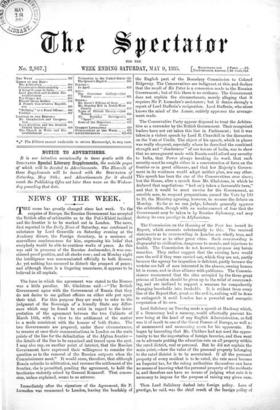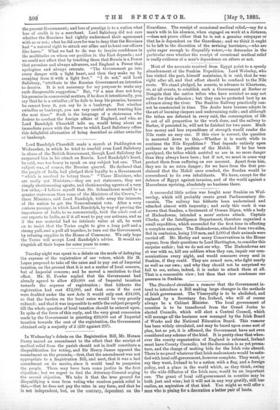Then Lord Salisbury dashed into foreign policy. Loss of prestige,
he said, was the chief result of the foreign policy of the present Government; and loss of prestige is to a nation what loss of credit is to a merchant. Lord Salisbury did not care whether the Russians had rightly understood their agreement with us or not; what he did care for was to deny that the Russians had "a natural right to attack our allies and to hunt our officers like hares." What we had to do was to inspire confidence in the multitudes on whom our position in the East depends ; and we could not effect that by teaching them that Russia is a Power that promises and always advances, and England a Power that apologises and always retreats. "The Government go into every danger with a light heart, and then they make up by escaping from it with a light foot." "I do not," said Lord Salisbury, "attribute to the Russian Government an intention to deceive. It is not necessary for my purpose to make any such disagreeable suggestion." But, "if a man does not keep his promise in commercial matters, if he does it intentionally, you say that he is a swindler ; if he fails to keep his promise, because he cannot keep it, you say he is a bankrupt. But whether swindler or bankrupt, you are very careful about trusting him the next time." Such is the language of a statesman who desires to conduct the foreign affairs of England, and who, as Lord Randolph Churchill tells us, would bring about an immediate peace with the Power to which Lord Salisbury offers this delightful alternative of being described as either swindler or bankrupt.



































 Previous page
Previous page